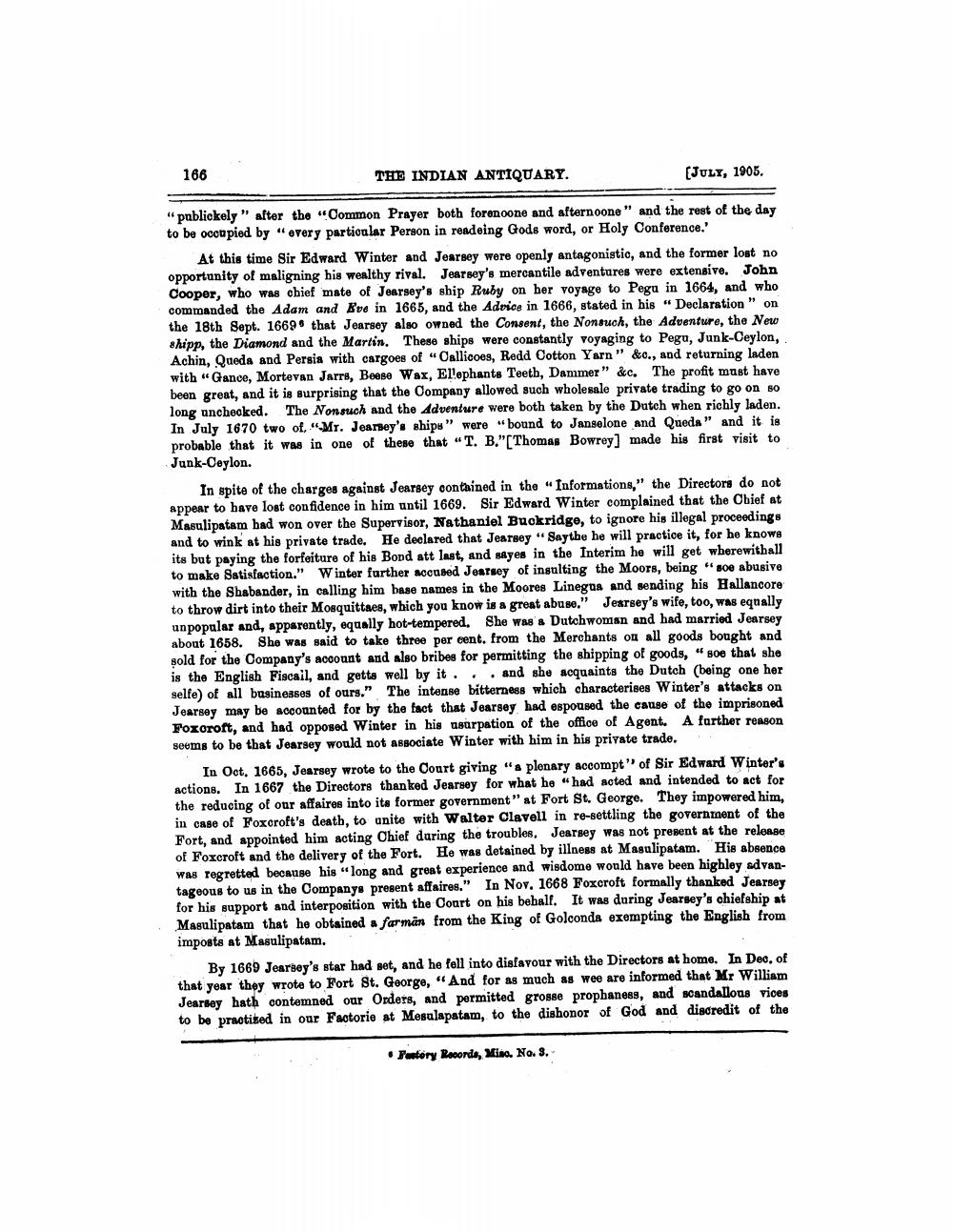________________
166
THE INDIAN ANTIQUARY.
[JULY, 1905.
"publickely" after the Common Prayer both forenoone and afternoone" and the rest of the day to be occupied by "every particular Person in readeing Gods word, or Holy Conference.'
At this time Sir Edward Winter and Jearsey were openly antagonistio, and the former lost no opportunity of maligning his wealthy rival. Jearsey's mercantile adventures were extensive. John Cooper, who was chief mate of Jearsey's ship Ruby on her voyage to Pega in 1664, and who commanded the Adam and Eve in 1665, and the Advics in 1666, stated in his "Declaration " on the 18th Sept. 16698 that Jearsey also owned the Consent, the Nonsuch, the Adventure, the New shipp, the Diamond and the Martin. These ships were constantly voyaging to Pega, Junk-Ceylon, Achin, Queda and Persia with cargoes of "Callicoes, Redd Cotton Yarn " &c., and returning laden with Gance, Mortevan Jarre, Beese Wax, Elephants Teeth, Dammer" &c. The profit must have been great, and it is surprising that the Company allowed such wholesale private trading to go on so long unchecked. The Nonsuch and the Adventure were both taken by the Dutch when richly laden. In July 1670 two of, "Mr. Jeanboy's ships" were bound to Janselone and Queda" and it is probable that it was in one of these that "T. B."[Thomas Bowrey] made his first visit to Junk-Ceylon.
In spite of the charges against Jearsey contained in the "Informations," the Directors do not appear to have lost confidence in him until 1669. Sir Edward Winter complained that the Obief at Masulipatam bad won over the Supervisor, Nathaniel Buckridge, to ignore his illegal proceedings and to wink at his private trade. He declared that Jearsey " Saythe he will practice it, for he knows its but paying the forfeiture of his Bond att last, and sayes in the Interim he will get wherewithall to make Satisfaction." Winter further accused Jeatsey of insulting the Moors, being "soe abusive with the Shabander, in calling him base names in the Moores Linegua and sending his Hallancore to throw dirt into their Mosquittaes, which you know is a great abuse." Jearsey's wife, too, was equally unpopular and, apparently, equally hot-tempered. She was a Dutchwoman and had married Jearsey about 1658. She was said to take three per cent. from the Merchants on all goods bought and sold for the Company's account and also bribes for permitting the shipping of goods, "soe that she is the English Fiscail, and getts well by it ... and she acquaints the Dutch (being one her selfe) of all businesses of ours." The intense bitterness which characterises Winter's attacks on Jearsey may be accounted for by the fact that Jearsey had espoused the cause of the imprisoned Foxoroft, and had opposed Winter in his usurpation of the office of Agent. A farther reason seems to be that Jearsey would not associate Winter with him in his private trade.
In Oct. 1665, Jearsey wrote to the Court giving "a plenary accompt' of Sir Edward Winter's actions. In 1667 the Directors thanked Jearsey for what he had acted and intended to act for the reducing of our affaires into its former government" at Fort St. George. They impowered him, in case of Foxcroft's death, to unite with Walter Clavell in re-settling the government of the Fort, and appointed him acting Chief daring the troubles, Jearsey was not present at the release of Foxcroft and the delivery of the Fort. He was detained by illness at Masalipatam. His absence was regretted because his long and great experience and wisdome would have been highley advantageous to us in the Companys present affaires." In Nov. 1668 Foxcroft formally thanked Jearsey for his support and interposition with the Court on his behalf. It was during Jearsey's chiefship at Masulipatam that he obtained a farman from the King of Golconda exempting the English from imposts at Masulipatam.
By 1669 Jearsey's star had set, and he fell into disfavour with the Directors at home. In Deo. of that year they wrote to Fort St. George, “And for as much as we are informed that Mr William Jeartey hath contemned our Orders, and permitted grosse prophaness, and scandallous vices to be practised in our Factorie at Mesulapatam, to the dishonor of God and discredit of the
• Putory Records, Mino. No. 3.




